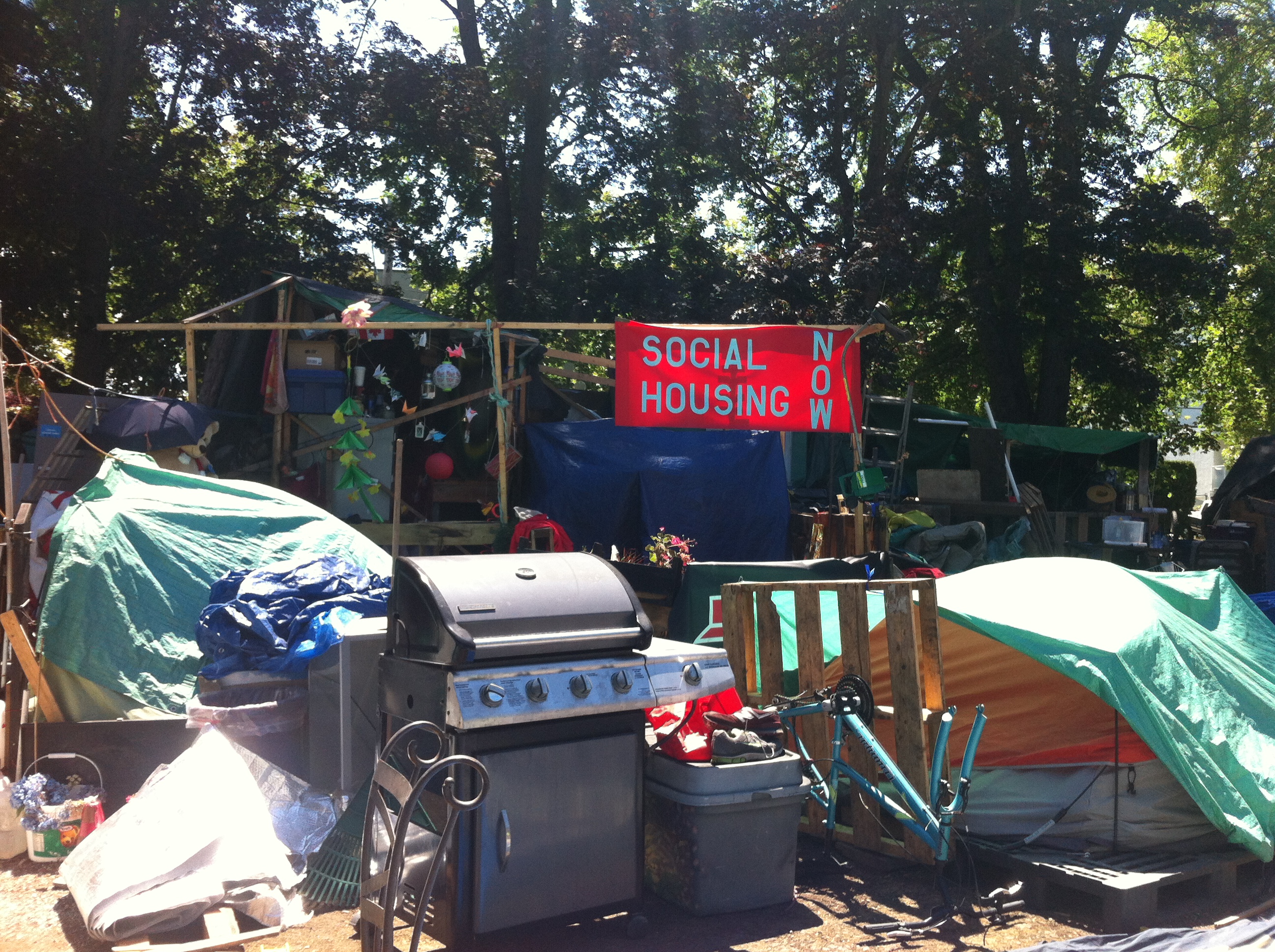Like this article? rabble is reader-supported journalism. Chip in to keep stories like these coming.
As a law student at Canada Without Poverty I have been watching human rights violations unfold in British Columbia over the Super InTent City case. After years of experiencing human rights only in the classroom, I have been full of emotions over the past eight months as I watched over 100 people who are homeless forced to fight for their community and basic rights.
Since November a community of people have erected a tent city on the Victoria courthouse lawn and attracted attention as they demanded housing. Known as Super InTent City, the community became a safe haven from daily displacement, which causes physical, emotional, and psychological harm. The B.C. government tried to have the camp residents removed through repeated legal battles right down to the last verdict earlier this month.
First, I was hopeful — this may be the stand Canada needs for a strong, rights-based, national housing strategy. This was quickly followed by fear — that this would be another moment where courts and governments sweep the needs of those who are homeless under the rug.
In April, Justice Hinkson denied the government’s requests to evict the community. Concerns about lawn maintenance, aesthetic and recreational uses of the lawn and fear grounded in stigma against homelessness, were weighted against people’s lives. The arguments reflected a severe lack of supports for people who are homeless. After all, in 2014 B.C. saw a 70 per cent spike in largely preventable homeless deaths when 46 people died because health and housing supports did not reach them in time. In his decision, Justice Hinkson showed clear support for the life-saving aspects of the community and did not let legal nuisance outweigh people’s lives.
However, upon a second application by the government, Justice Hinkson decided to grant B.C. permission to remove residents from Super InTent City.
I can’t help but wonder: what happened to change his mind and what does this mean for residents?
At first glance, the decision seems reasonable. B.C. started building 140 housing units for camp residents and is further investing in temporary shelter and housing initiatives. Both options are said to be available by August 8, when the court has ordered camp residents to vacate.
Justice Hinkson also cited concerns about security in the camp in his final decision to shut down the community. He appeared to have sided with testimonies from neighbours rife with discomfort and assumptions about people in the camp that can only be described as NIMBYism.
If Justice Hinkson used a human rights approach, he would have integrated specific standards into his decision. A human rights approach understands how affordable, secure and accessible housing connects to other rights like food, water and sanitation, work and non-discrimination — rights many take for granted.
Among other elements, a rights approach acknowledges and protects the right to housing and requires direct participation by people with experiences of homelessness and accountability mechanisms entrenched in law. If courtrooms continue to avoid human rights standards, concerns rooted in discrimination can easily dismiss the effects of displacement on the health, well-being, and dignity of those in Super InTent City. Overall, I can’t help but think that poverty stereotypes and neighbourhood fear of the homeless were weighed more heavily this time around.
So as I read this second decision, I felt conflicted. Once again, people experiencing homelessness are being displaced by the justice system, government, and surrounding neighbourhood.
Whether Super InTent City has become unsafe or not, there are people in the camp who are entitled to have their human rights respected. What’s more, there are over 235,000 people across Canada in similar situations of visible homelessness whose rights are violated on a daily basis. The number of hidden homeless — people who live temporarily with others — is much higher.
Deaths due to homelessness is not just a B.C. issue. A McMaster study found a 21-year difference in life expectancy within the poorest and wealthiest communities in Hamilton, Ontario. It is unbelievable that in the face of this crisis, Canada has not yet implemented a rights-based, national housing strategy.
While some housing alternatives for Super InTent City are under construction, many questions remain: When will construction be complete? Will the government respect the community’s rights throughout the transition? Will residents be consulted? Will root causes of homelessness be addressed?
I worry what the answers will be.
But my hope remains. With another tent city growing in Vancouver, maybe this is just the start of a much needed conversation about rights.
Jessica Hawkins is Canada Without Poverty’s 2016 summer student and is a law student at the University of Ottawa.
Like this article? rabble is reader-supported journalism. Chip in to keep stories like these coming.



